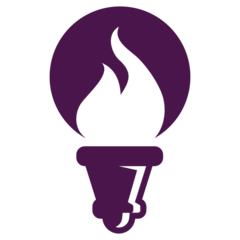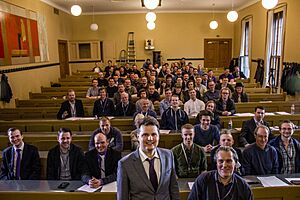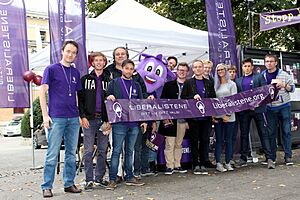Liberalistene facts for kids
Quick facts for kids
Capitalist Party
Liberalistene
|
|
|---|---|
 |
|
| Abbreviation | Lib |
| Leader | Arnt Rune Flekstad |
| Secretary | Oddbjørn Sjursen |
| Founded | 7 April 2014 |
| Registered | 2016 |
| Preceded by | Liberal People's Party |
| Headquarters | Oslo |
| Youth wing | Capitalist Youth (Liberalistisk Ungdom) |
| Ideology | Classical liberalism Laissez-faire Minarchism Euroscepticism |
| Political position | Right-wing |
| International affiliation | International Alliance of Libertarian Parties Interlibertarians |
| Colours | Purple |
| Slogan | Your life, your choice! (Ditt liv, ditt valg!) |
| Parliament |
0 / 169
|
| Regional Councils |
0 / 728
|
| Local Councils |
0 / 10,781
|
| Sámi Parliament |
0 / 39
|
The Capitalist Party (in Norwegian, Liberalistene) is a political party in Norway. It was started in 2014 and officially registered in 2016. The party now has groups in all parts of Norway, including many cities and towns.
The party believes in a very small government. This means they think the government should only handle a few important things. Their ideas are based on Western constitutionalism and free market economics. The party is led by its central board, with Arnt Rune Flekstad as the leader since 2022. The party also has a group for young people called the Capitalist Youth.
In 2017, the Capitalist Party took part in its first national election. They ran candidates in every area of Norway. Two years later, they also participated in local elections across many counties and cities.
Contents
What the Capitalist Party Believes
The Capitalist Party's ideas come from classical liberalism and the Age of Enlightenment. They want a government that does very little. They believe the government's main jobs should be to manage the police, the military, and the justice system.
The party thinks the government should not force people to do things. Its only purpose is to protect people from harm, theft, and cheating. The Capitalist Party prefers solutions that people choose freely, rather than solutions forced by the government. They believe that when businesses compete freely, they offer better, cheaper, and more effective services.
The party's main idea is that each person owns their own life. This means you are responsible for your choices and your success. You also have the right to follow your own interests, as long as you don't harm others' rights.
The Capitalist Party strongly believes in Western constitutionalism. This means they support separating government power into three parts:
- The executive (like the prime minister)
- The legislative (like the parliament)
- The judicial (like the courts)
They believe this system of checks and balances protects people's freedoms. It also stops the government from becoming too powerful.
When it comes to money, the party supports laissez-faire economics. This means they want a free market with very few rules or taxes. They think that too many rules stop people from being free and creative. They believe people should work together freely and peacefully, without the government getting involved.
How the Party is Organized
The Capitalist Party was started in 2014. Its main office is in Oslo. The party has groups in every county in Norway.
The national leaders are part of the Central Executive Committee. As of 2022, this committee includes the leader Arnt Rune Flekstad, political deputy Jan-Øyvind Lorgen, and secretary Oddbjørn Sjursen. Members of the party choose their leaders and rules at yearly meetings. These meetings happen at both regional and national levels.
The party's youth wing is called The Capitalist Youth (Liberalistisk Ungdom). This group was formed in 2004. It was first connected to the Liberal People's Party. But in 2014, it joined the Capitalist Party.
Party Leaders Over Time
| Term | Leader | Political Deputy | Deputy leader | Secretary | Youth Leader |
|---|---|---|---|---|---|
| 2014–2015 | Espen Hagen Hammer | Agnethe Johnsen | Eigil Knudsen | Petter Hagelien | |
| 2015–2016 | Arnt Rune Flekstad | Roald Ribe | Eigil Knudsen | Petter Hagelien | |
| 2016–2017 | Arnt Rune Flekstad | Roald Ribe | Eigil Knudsen | Fredrik Laving | |
| 2017–2018 | Arnt Rune Flekstad | Roald Ribe | Geir Hoksnes | Fredrik Laving | |
| 2018–2019 | Arnt Rune Flekstad | Fredrik Laving | Amund Farberg | Benjamin Bringsås | |
| 2019–2020 | Arnt Rune Flekstad | Kjell Bakke | Kenneth Tolås | Jan-Øyvind Lorgen | Benjamin Bringsås |
| 2020–2021 | Ronny Skjæveland | Roald Ribe | Aleksander Aas | Jan-Øyvind Lorgen | Benjamin Bringsås |
| 2022– | Arnt Rune Flekstad | Jan-Øyvind Lorgen | Nicolay Normann Grundt | Oddbjørn Sjursen | Carl Fredrik G. Løken |
Party History and Elections
At its first national meeting, the Capitalist Party supported the idea of creating Liberland. This is a micronation founded by a Czech libertarian.
In March 2015, the Capitalist Party collected enough signatures to run in Oslo's local elections. They received 458 votes. They held their second national meeting in Oslo in April 2016. The third national meeting was also in Oslo in April 2017.
In 2017, the party took part in its first national election for parliament. They ran candidates in all election areas. They received 5,599 votes, which was 0.2% of all votes.
In late 2017 and 2018, the Capitalist Party created guides for local political plans. These guides helped local party groups create their own plans. These guides were approved at the fourth national meeting. In 2019, the Capitalist Party participated in its second local elections. They ran candidates in all counties and 42 municipalities. The Oslo group also ran candidates in 7 out of 15 city districts. At the 2019 national meeting, the party changed its leadership structure. They added a political deputy role.
Per Sandberg, a former Minister and Member of Parliament, joined the Capitalist Party in September 2020. He was previously a leader in the Progress Party. The 2020 national meeting also finished a new national political plan. This plan aimed to make the party's views clearer for the parliamentary period from 2021 to 2025.
Election Results
| Election Year | Election Type | Number of votes | % |
|---|---|---|---|
| 2015 | Municipal | 458 | 0% |
| 2017 | Parliament | 5,599 | 0.2% |
| 2019 | Municipal | 4,482 | 0.2% |
| 2019 | County | 6,379 | 0.3% |
| 2021 | Parliament | 4,520 | 0.2% |
Party Meetings (Congresses)
|



